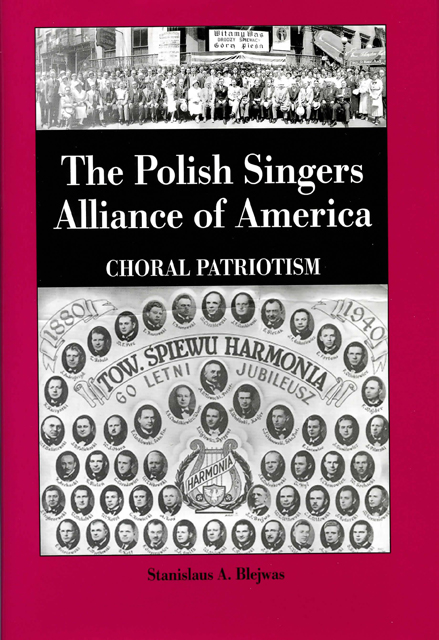Book contents
- Frontmatter
- Contents
- List of Illustrations
- Foreword
- Acknowledgments
- Introduction
- 1 “To Sing Out the Future of Our Beloved Fatherland”
- 2 Pieśni o ziemi naszej (Songs of Our Land)
- 3 The Convention of “Unhappy Memory”
- 4 “Active Duty”
- 5 “Cultural Care”
- 6 World War II and a New Immigration
- 7 The Czechlewski Years: The Ideological Organization Redefined
- 8 Polish American Choral Culture
- 9 “Let Poland Be Poland!”
- 10 Quo Vadis Polish Song in North America?
- Appendix A PSAA National Officers
- Appendix B National Conventions
- Appendix C Individual Choirs
- Appendix D Honorary Members
- Appendix E Compositions of Antoni Małłek Celebrating the Holy Trinity Immigrant Neighborhood in Chicago
- Appendix F Membership
- Appendix G Hlond Trophy Winners
- Appendix H Children’s Choirs
- Appendix I Selected Biographies
- Appendix J Competition Songs, Winning Choirs, and Free Selection at National Conventions of the Polish Singers Alliance of America
- Appendix K Guest Artists and Selections Performed at National and International Conventions of the Polish Singers Alliance of America, 1905–1998
- Appendix L Songs Sung by Choirs at Concerts of the National and International Conventions of the Polish Singers Alliance of America
- Appendix M PSAA Districts and Choirs—1999
- Notes
- Bibliography
- Index
- Frontmatter
- Contents
- List of Illustrations
- Foreword
- Acknowledgments
- Introduction
- 1 “To Sing Out the Future of Our Beloved Fatherland”
- 2 Pieśni o ziemi naszej (Songs of Our Land)
- 3 The Convention of “Unhappy Memory”
- 4 “Active Duty”
- 5 “Cultural Care”
- 6 World War II and a New Immigration
- 7 The Czechlewski Years: The Ideological Organization Redefined
- 8 Polish American Choral Culture
- 9 “Let Poland Be Poland!”
- 10 Quo Vadis Polish Song in North America?
- Appendix A PSAA National Officers
- Appendix B National Conventions
- Appendix C Individual Choirs
- Appendix D Honorary Members
- Appendix E Compositions of Antoni Małłek Celebrating the Holy Trinity Immigrant Neighborhood in Chicago
- Appendix F Membership
- Appendix G Hlond Trophy Winners
- Appendix H Children’s Choirs
- Appendix I Selected Biographies
- Appendix J Competition Songs, Winning Choirs, and Free Selection at National Conventions of the Polish Singers Alliance of America
- Appendix K Guest Artists and Selections Performed at National and International Conventions of the Polish Singers Alliance of America, 1905–1998
- Appendix L Songs Sung by Choirs at Concerts of the National and International Conventions of the Polish Singers Alliance of America
- Appendix M PSAA Districts and Choirs—1999
- Notes
- Bibliography
- Index
Summary
On May 30, 1995, The New York Times reviewed a New York performance of the internationally known composer, Henryk Górecki. Apart from the program, the reviewer was intrigued by what brought Górecki to New York. The composer, who had declined invitations from prestigious ensembles, did not perform in New York at a conventional concert hall or with famous musicians. Rather, he appeared at the Marriott Marquis Hotel “on a program otherwise devoted to amateur Polish- American choruses and dancers.” The occasion was the 44th international convention of the Polish Singers Alliance of America.
The reviewer commented favorably upon Górecki's performance, and then tried to explain Górecki's presence. The event had a certain “bittersweet charm.” There were choirs in folk costume and others in contemporary concert dress; the singing and conducting were “longer on enthusiasm than on such niceties as unified attacks and releases”; and the piano accompaniments were “often slipshod.” However, the reviewer concluded, “the point here is safeguarding a tradition, not giving streamlined performances.”
These last remarks captured the essence of the story. They explain Górecki's tribute to the Polish Singers Alliance and the Alliance's purpose. Since its founding in 1889, the Alliance's mission is “to propagate and cultivate Polish national song among the Poles in America,” to acquaint Poles and Americans with the works of Polish composers, and, “through song, to sustain the old-Polish love (staropolska miłość) of the Fatherland within the Polish-American immigration.” In the history of the Polish immigration in America, the Alliance was an “ideological organization.”
Ideological organizations were, and remain, common to the history of immigration to America. This was especially true in the decades between the American Civil War and World War I, when waves of immigrants from Southern and Eastern Europe migrated to the New World. In the Polish immigrant community, as in other immigrant and ethnic communities, the ideological organization had a patriotic purpose. Karol Wachtl, an early historian of the Polish Roman Catholic Union, summarized its mission as “the elevation of patriotic consciousness, the preservation of national separateness (odrębność), resistance to denationalization, [and] maintaining spiritual links with the Fatherland.”
- Type
- Chapter
- Information
- The Polish Singers Alliance of America 1888-1998Choral Patriotism, pp. xix - xlivPublisher: Boydell & BrewerPrint publication year: 2005

